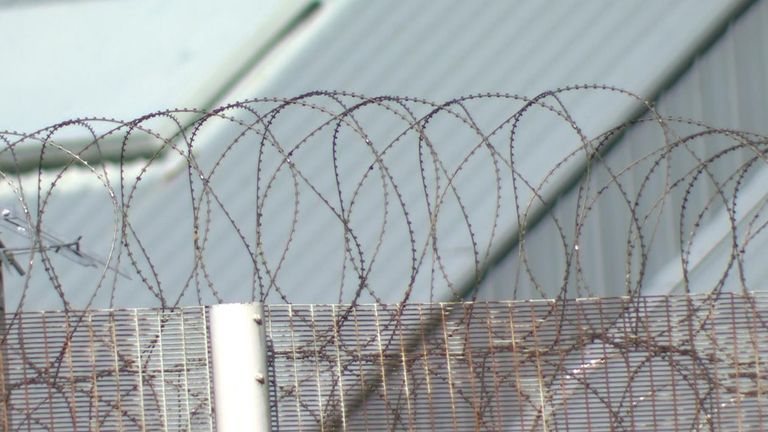A prisoner who has served 12 years in jail for stealing a mobile phone was unable to attend a psychiatric assessment because of a lack of staff, his family claims.
According to psychiatrists, Thomas White has developed psychosis as a direct result of being handed a controversial indefinite jail term called imprisonment for public protection (IPP), which was abolished in 2012.
His sister has been campaigning for over a year to have him transferred to a hospital, which would require him to receive sign-off from two separate psychiatrists.
Ms White said her brother, who experiences religious hallucinations, was placed in segregation and needed three prison staff to release him from his cell – but they were not available due to staff shortages.
Politics latest: PM ‘may have heeded warning’ from Trump’s victory
Sky News understands that Lord Blunkett, the former Labour home secretary who introduced the IPP sentence but now campaigns for reform, has asked prisons minister Lord Timpson to investigate.
What are IPP sentences?
Thomas White, now aged 40, was one of more than 8,000 offenders who were given an IPP sentence – a type of open-ended prison sentence the courts could impose from 2005 until they were scrapped.
The sentence – which has been described as a form of “psychological torture” by human rights experts – was intended for serious violent and sexual offenders who posed a significant risk of serious harm to the public but whose crimes did not warrant a life term.
Although the government’s stated aim was public protection, concerns quickly grew that IPP sentences were being applied too broadly and catching more minor offenders, partly due to the fact that previous convictions were taken into account when determining whether someone posed a “significant risk”.
Thomas was sentenced to two years for stealing the mobile phone in a non-violent exchange back in 2012 – but because he had 16 previous convictions for theft and robberies, he was given an IPP sentence and has served 12 years.
The coalition government scrapped the sentence in 2012, but the change was not applied retrospectively, meaning 2,852 prisoners remain behind bars – including 1,227 who have never been released.
The new government is under increasing pressure to act on the IPP crisis given they were introduced by Lord Blunkett – who has since said he feels “deep regret” about the way the sentence was used.
‘My brother is being seriously failed’
In an email to Lord Blunkett, seen by Sky News, Ms White said: “My brother had a psychiatric appointment on the 1 November to see if he could be admitted to an outside hospital as he has to have two signatures to be transferred to an outside hospital.
“The system is nothing but criminal – people like my brother are being seriously failed.
“We waited a long time to have Thomas assessed again by the psychiatrist. We more than likely won’t get the assessment again.”
Read more:
11 years for stealing a mobile phone: Inside the lives of IPP prisoners
The £1bn cost of keeping people in prison on indeterminate IPP sentences
James Frith, the Labour MP for Bury North, said: “Thomas’ case highlights why these sentences were abolished over a decade ago.
“Thomas’s indefinite imprisonment has had a hugely detrimental impact on his mental and physical wellbeing. Thomas should be a patient, not a prisoner.
“We know the prison system is underfunded and overcapacity, but this is no excuse for failing Thomas. I have been working with Clara, Thomas’ sister, and I have written to the Lord Chancellor to raise Thomas’s case and the wider issues of IPPs.
“Thomas has been denied appropriate assessment and care for too long, we will not give up this fight for what is right.”
The Ministry of Justice does not comment on individual medical cases.
It is understood Lord Timpson will respond to Lord Blunkett in due course.



